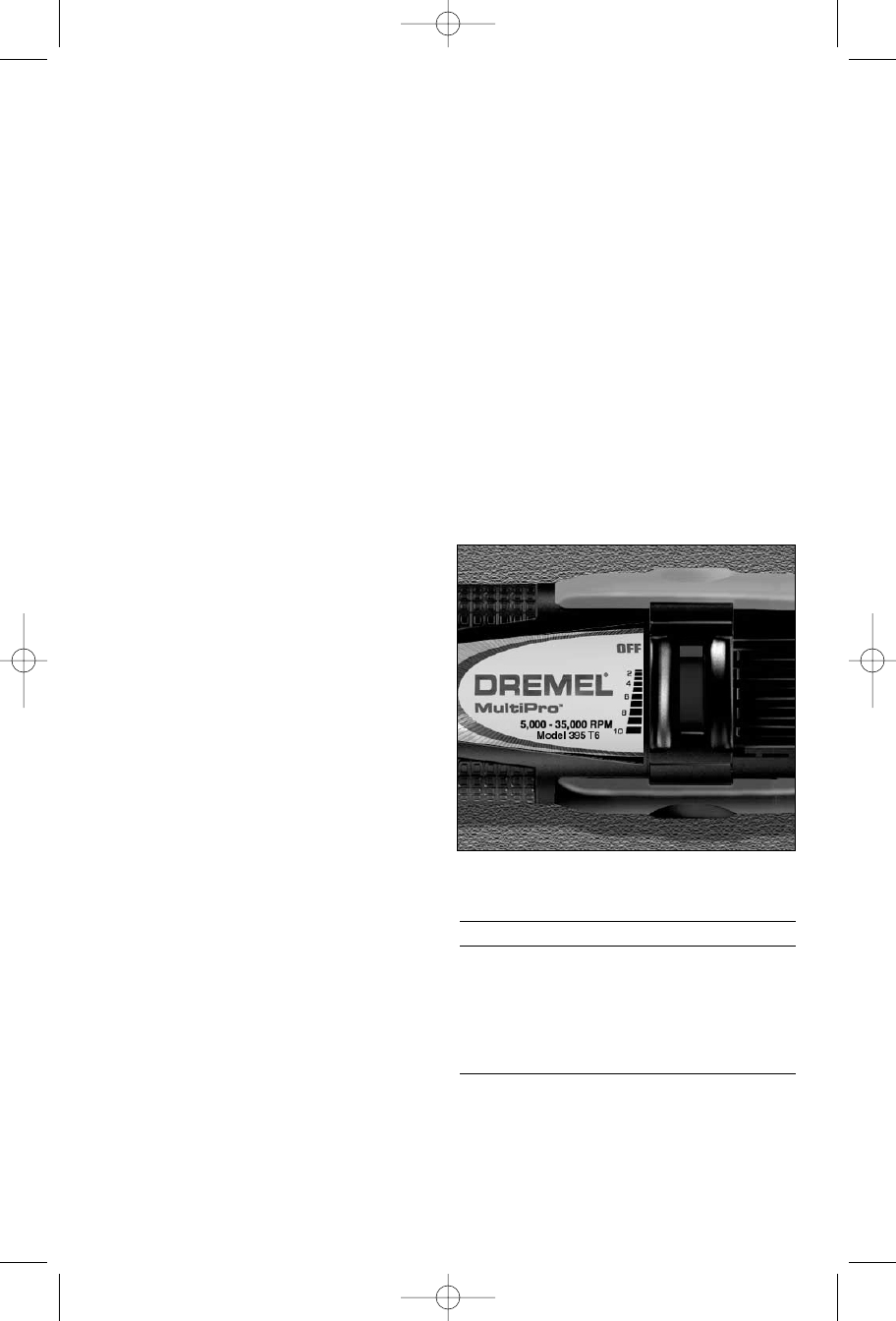
P
age 11
Set the speed indicator to fit the job; to achieve the
best job results when working with different mate-
rials, the speed of the Rotary Tool should be regu-
lated. Only a full wave output speed control such as
the Dremel Model 221 should be used with the
275T6 Rotary Tool.
To select the right speed for each job, use a practice
piece of material. Vary speed to find the best speed
for the accessory you are using and the job to be
done.
NOTE: Speed is affected by voltage changes. A
reduced incoming voltage will slow the RPM of the
tool, especially at the lowest setting. If your tool
appears to be running slowly increase the speed
setting accordingly. The tool may not start at switch
position #1 in those areas where outlet voltage is
less than 120 volts. Simply move the switch lever to
a higher position to begin operation.
There are three basic types of Rotary Tools: single
speed, two-speed and variable speed models.
On the single speed model, there is an ON-OFF
switch. When the switch is on, the tool runs at 35,000
RPM.
On the two-speed model, there is a LO and HI switch.
When the switch indicator is on the low setting, the
tool runs at about 15,000 RPM. When the switch
indicator is on the high setting, the tool runs at about
35,000 RPM.
On the variable speed model, there are switch setting
indicators marked with a line. Slide to the number on
the housing to select the operating speed needed
from 5,000 – 35,000 RPM.
You can refer to the
charts on page 24, 25, and 26 to determine the
proper speed, based on the material being worked
and the type of accessory being used. These charts
enable you to select both the correct accessory and
the optimum speed at a glance.
If you have a single-speed or two-speed model, you
will be able to use many accessories to do a wide
assortment of jobs. For the majority of applications,
all models of the Rotary Tool should be used at top
speed.
Needs for Slower Speeds
Certain materials, however, (some plastics and
precious metals, for example) require a relatively slow
speed because at high speed the friction of the
accessory generates heat and may cause damage to
the material.
Slow speeds (15,000 RPM or less) usually are best
for polishing operations employing the felt polishing
accessories. They may also be best for working on
delicate projects as “eggery” work, delicate wood
carving and fragile model parts. (All brushing
applications require lower speeds to avoid wire
discharge from the holder.) No greater than speed
setting 4 for the model 395-T6.
Higher speeds are better for carving, cutting, routing,
shaping, cutting dadoes or rabbets in wood.
Hardwoods, metals and glass require high speed
operation, and drilling should also be done at high
speeds.
The speed of Rotary Tool is controlled by setting
this indicator on the housing.
The Settings for Approximate Revolutions Per Min-
ute Rotary Tool Variable Speed Model 395T6.
Switch Setting Speed Range
2 15,000 – 18,000 RPM
4* 19,000 – 11,000 RPM
6
12,000 – 17,000 RPM
8 18,000 – 24,000 RPM
10 25,000 – 35,000 RPM
* 395-T6 Wire Brush Setting.
Use only Dremel Tested, High Performance Accessories.
Operating Speeds
DM 2610925474 10-04 10/19/04 3:40 PM Page 11


















